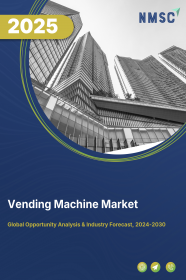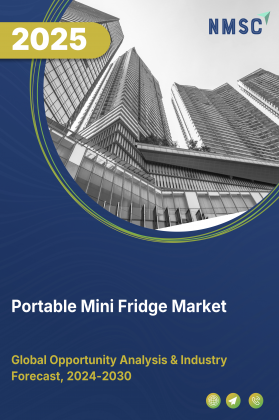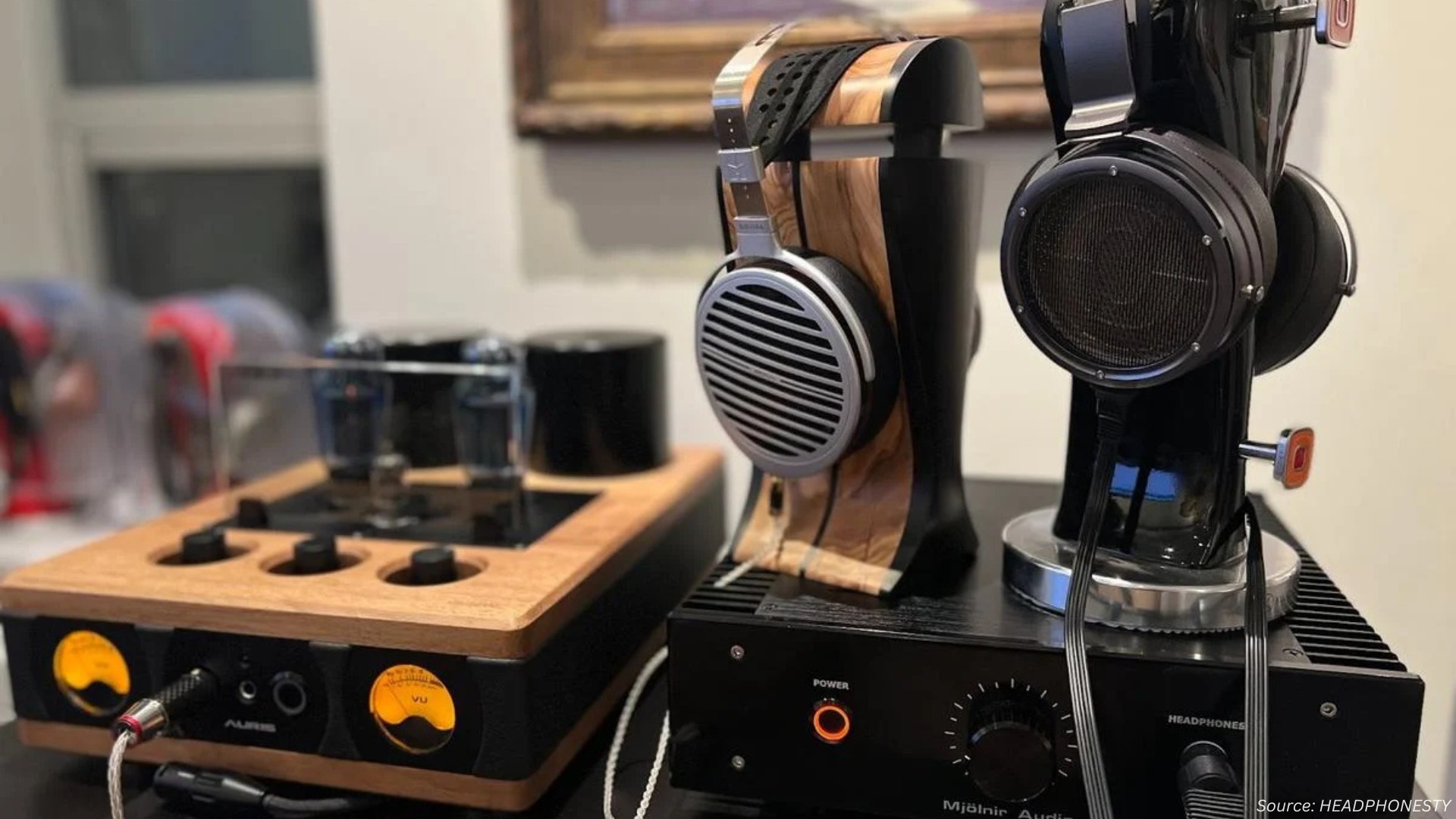
Vending Machine Market by Product Type (Food and Beverages Vending Machine, Confectionary Vending Machine, Healthcare and Hygiene Vending Machine and Others), by Technology (Automatic Machine, Semi-Automatic Machine, and Smart Machine), by Payment Mechanism (Cash-Based Vending Machine, and Cashless-Based Vending Machine), by Temperature Control (Refrigerated Vending Machine, and Non-Refrigerated Vending Machine), and Others– Global Opportunity Analysis and Industry Forecast, 2025–2030
Market Definition:
According to NMSC, the global vending machine market size in 2024 was USD 23065.3 million, and is estimated to reach USD 25879.3 million in 2025 and is projected to reach USD 34959.4 million by 2030 with a CAGR of 6.20%. According to NMSC, in term of volume the market size was 12 million units in 2024, and is estimated to reach 15 million units in 2025 and is projected to reach 23 million units by 2030 with a CAGR of 9.3%. A vending machine is an automated system that dispenses small products or items, such as packaged food, beverages, candy, ice cream, and others, in exchange for currency or tokens. It can operate autonomously and are frequently found in bustling urban areas, providing convenience to users with hectic lifestyles. They provide a feature that includes touchscreen controls, gesture-based interaction, audio, and others, thus improving the overall shopping experience.
Vending machines provide benefits such as efficiently utilizing compact space, fewer labor expenses, diverse product ranges, and significant sales potential in high-traffic urban areas, including railway stations and shopping malls. Embracing these advantages can lead to enhanced customer convenience and improved business profitability through vending machines.
Market Dynamics and Trends
The vending machine market is witnessing a significant growth, driven by the introduction of automated and versatile vending machines. Modern consumers seek efficient and convenient solutions to cater to their fast-paced lifestyles, including automated beverage solutions.
The recent vending machine technology has evolved to meet these demands, with the development of machines that offer multiple dispensing options at a time along with multi-functionality. These innovations streamline the shopping experience and address consumer needs, leading to a substantial growth in the vending machine market.
For instance, In June 2023, Gem Opencube Technologies Pvt. Ltd. launched an automatic vending machine, the world’s first Water, Tea, and Coffee (WTC) vending machine. It was introduced in India, and it can operate without human Intervention.
Moreover, the increasing demand for vending machines in various commercial places such as hotels, airports, shopping malls, markets, and factories, owing to the growing development of business centers worldwide, is propelling the market growth.
For instance, in February 2022, Farmer’s Fridge collaborated with Minneapolis-St, a vending machine brand that sells fresh and healthy meals. Pauls International Airport (MSP) set up multiple refrigerated vending machines, offering quick snacks, salad, and meal bowls. The brand has also expanded its vending machine in various airports throughout the U.S. region.Also, in July 2021, Hindustan Unilever, a consumer goods company, introduced a vending machine for homecare products in a mall in India as a trial run that turned out to attract ample customers.
However, the initial investment costs for vending machines restrain the growth of the market. These costs encompass hardware, software customization, and ongoing maintenance, which are barriers to steady the market growth. On the contrary, technologically developed vending machines, such as smart vending machines based on artificial intelligence (AI) to improve accessibility, are expected to create ample opportunities in the coming years.
Market Segmentations and Scope of the Study
The vending machine market share is segmented based on type, technology, application, sales channel, and region. On the basis of type, the market is segmented into food product, beverage, and others. Based on technology, the market is divided into automatic, semi-automatic, and smart.
Based on application, the market is classified into corporate office, commercial places, hotel and restaurants, and others. Based on sales channel, the market is categorized into online and offline. The regional breakdown and analysis of each of the aforesaid segments includes regions, such as North America, Europe, Asia-Pacific, and the Rest of the World (RoW).
Geographical Analysis
Currently, North America dominates the vending machine market. This is primarily due to the substantial research and developments taking place in the healthcare domain within the region. These advancements contribute to the development of specialized offerings in vending machines catering to mental health emergencies, particularly in healthcare-related products and harm reduction supplies. As a result, North America’s focus on healthcare innovation leads to lucrative growth opportunities for the vending machine market in the region.
For Instance, in June 2023, The NYC Department of Health and Mental Hygiene introduced its public health vending machine in collaboration with Services for the Underserved (S:US). This initiative aims to provide 24/7 access to harm-reduction supplies while supporting mental health goals. There have been successful instances of such machines in multiple parts of the North American region that have shown effectiveness in lowering overdose and spreading infectious diseases.
Moreover, the increasing collaborations between consumers and manufacturers are driving the growth of the vending machine market in this region. These partnerships enable strategic placement and effectively cater to consumer demands, which further fuels the market growth.
For instance, in May 2022, Coca-Cola collaborated with the University of Arkansas to become the university's official non-alcoholic cold beverage sponsor, where its products will be sold in the athletics arena, campus dining facilities, and vending machines. The collaboration aims to cater to the demands of the students and provide them with better and more convenient options than befores.
On the other hand, the Asia-Pacific region is expected to witness an immense rise in the vending machine market, driven by strong government backing for expanding commercial accessibility in times of natural emergency. Government initiatives supporting widespread vending machine deployment in precaution to food crises during any natural calamity are substantially increasing vending machines in the market. This futuristic emphasis on accessibility creates a potential opportunity for the market to grow faster in the region.
For instance, in June 2023, the government of Ako, Japan, installed multiple vending machines that provide free food and drinks to individuals in distress during typhoons, earthquakes, or other natural disasters. Also, the introduction of smart vending machines by local retailers and developers that can take orders through touch panels and accept mobile payments is contributing to the growth of the vending machine industry.
For instance, in July 2023, Forth Corp. introduced a Tao Bin vending machine that functions on a touch panel and can accept mobile payments. About 6,000 vending machines have been placed in train stations and apartments across Thailand, selling nearly 200,000 drinks daily. Such a wide usage of vending machines can engage more customers, leading to the business expansion.
Competitive Landscape
Various market players operating in the vending machine industry are SandenVendo America, Inc., Crane Payment Innovations (CPI), Azkoyen Group, Fuji Electric Co., Ltd., Royal Vendors, Inc., Seaga Manufacturing, Inc., Jofemar Corporation, Selecta TMP AG, Bianchi Industry, Fraxotic Innovations Pvt. Ltd., Evoca Group., EnvCure Technocrat LLP., Doha Systems, Senso Foods Pvt. Ltd., Daalchini Technologies Pvt. Ltd. These market players are adopting various strategies such as product launches and collaborations to remain dominant in the market.
For instance, In June 2022, Azkoyen Group released an upgraded Nebular version, a cloud platform for their vending machines. This technology enables seamless integration of hardware and software on a global platform.
Moreover, in February 2022, Selecta Group partnered with Mars Wrigley and introduced touchscreen vending machines that can display product information and payment processing in Europe. The vending machine was successful in attracting a large number of customers, which accelerated the sale of the products.
Key Benefits
-
The report provides a quantitative analysis and estimations of the vending machine market from 2024 to 2030, which assists in identifying the prevailing market opportunities.
-
The study comprises a deep-dive analysis of the current and future vending machine market trends, depicting the prevalent investment pockets in the market.
-
Information related to the key drivers, restraints, and opportunities along with their impact on the vending machine market is provided in the report.
-
Competitive analysis of the key players, along with their market share is provided in the report.
-
A SWOT analysis and the Porter's Five Forces model is elaborated on in the study.
-
Value chain analysis in the vending machine market study provides a clear picture of the stakeholders' roles.
Vending Machine Market Key Segments
By Product Type
-
Beverage Vending Machines
-
Food Vending Machines
-
Confectionery Vending Machines
-
Healthcare & Hygiene Vending Machines
-
Others
By Technology
-
Automatic Machine
-
Semi-Automatic Machine
-
Smart Machine
By Payment Mechanism
-
Cash-Based Vending Machine
-
Cashless-Based Vending Machine
By Temperature Control
-
Refrigerated Vending Machine
-
Non-Refrigerated Vending Machine
By Application
-
Hotels & Restaurants
-
Corporate Offices and Institutions
-
Public Places
-
Other Applications
By Region
-
North America
-
The U.S.
-
Canada
-
Mexico
-
-
Europe
-
Germany
-
France
-
Italy
-
Spain
-
United Kingdom
-
Russia
-
Sweden
-
Norway
-
Denmark
-
Netherlands
-
Finland
-
Rest of Europe
-
-
Asia-Pacific
-
Australia
-
China
-
India
-
Japan
-
South Korea
-
Indonesia
-
Singapore
-
Taiwan
-
Thailand
-
Rest of Asia-Pacific
-
-
Rest of the World (RoW)
-
Latin America
-
Middle East
-
Africa
-
Key Players
-
SandenVendo America, Inc.
-
Crane Payment Innovations (CPI)
-
Azkoyen Group
-
Fuji Electric Co., Ltd.
-
Royal Vendors, Inc.,
-
Seaga Manufacturing, Inc.
-
Jofemar Corporation
-
Selecta TMP AG
-
Bianchi Industry
-
raxotic Innovations Pvt. Ltd.
-
Evoca Group.
-
EnvCure Technocrat LLP.
-
Doha Systems
-
Senso Foods Pvt. Ltd.
-
Daalchini Technologies Pvt. Ltd.
REPORT SCOPE AND SEGMENTATION:
|
Parameters |
Details |
|
Market Size in 2025 |
USD 25879.3 Million |
|
Revenue Forecast in 2030 |
USD 34959.4 Million |
|
Growth Rate |
CAGR of 6.2% from 2024 to 2030 |
|
Analysis Period |
2024–2030 |
|
Base Year Considered |
2024 |
|
Forecast Period |
2025–2030 |
|
Market Size Estimation |
Million (USD) |
|
Growth Factors |
The demand for vending machine is rising due to developing preference of consumers for convenience and automation. Increasing demand for vending machines in various commercial places is creating need for vending machines. |
|
Countries Covered |
28 |
|
Companies Profiled |
15 |
|
Market Share |
Available for 10 companies |
|
Customization Scope |
Free customization (equivalent to up to 80 working hours of analysts) after purchase. Addition or alteration to country, regional, and segment scope. |
|
Pricing and Purchase Options |
Avail customized purchase options to meet your exact research needs. |

















 Speak to Our Analyst
Speak to Our Analyst

























